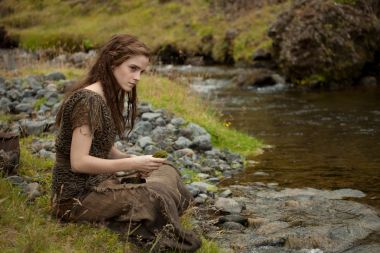Emma Watson: Biblical story of Noah had to be adapted for screen

Emma Watson has defended the artistic licence taken by director Darren Aronofsky in adapting the biblical story of Noah for the big screen.
The actress told the Associated Press that changes had to be made so that there would be dialogue in the film and more female roles.
"If we had gone with exactly the original story, Noah doesn't say anything until he steps off the ark. You would have been watching a silent film," she said.
The film has split opinion among Christians, with some refusing to even see it because they feel it strays too far from the original Old Testament story.
It has been banned in several Muslim-majority countries because it is deemed to be blasphemous.
Watch the trailer here:
Watson, who plays Noah's daughter Ila in the film, thinks the liberties that have been taken for the big screen adaptation are practical in nature.
"None of the women are really spoken about in the biblical story. There wouldn't have been any women in it. He [Darren Aronofsky] had to adapt it for the screen."
The film stars Russell Crowe in the lead role as Noah and is due out in cinemas in the US this Friday. It releases to UK cinemas on April 4.
While some Christians have denounced the film, others have urged Christians to see it and use it to engage in conversations.
Jonathan Snowden, biblical adviser for the film, said in an interview with The Christian Post: "We can have fun, spirited debates of how you'd do it differently if you had $125 million to make your version of Noah's ark, but let's focus on the opportunity for now."
In the UK, the Damaris Trust has produced resources for churches to use in conjunction with the film. They include clips from the film and short videos on the movie's themes that can be used alongside discussion starters.
The head of Damaris Trust, Nick Pollard, is enthusiastic about people going to see the film, saying it has "great potential to draw people into the Bible".
"Of course it is not a word-for-word retelling of the biblical story - it is far more than that," he said.
"Whilst faithfully telling the core story, this film brilliantly takes us into the mind of Noah and sets his task and the flood in the wider context of the whole biblical narrative.
"As someone who loves the Bible and has read (and preached on) the Noah story very many times I am sure that this film has a marvellous potential to encourage people to think about questions of faith and doubt, righteousness and wickedness, judgment and mercy, and the relationship between humanity, the world and God.
"It can stimulate people to look at the original story for themselves. It can provoke a national conversation about the Bible."
The extent of the controversy has forced Paramount Pictures to attach a disclaimer to the film's promotion stating that it is "inspired" by the biblical account of Noah.
"While artistic license has been taken, we believe that this film is true to the essence, values, and integrity of a story that is a cornerstone of faith for millions of people worldwide," it says.











